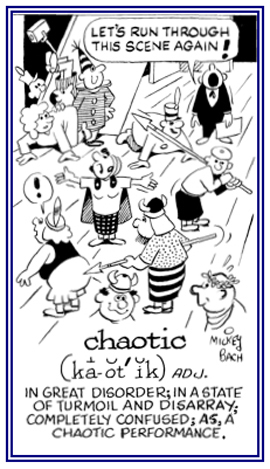-otic +
(Greek: a suffix that means: state or condition of; diseased condition of)
chaotic (adjective), more chaotic, most chaotic
1. Pertaining to an unordered, unpredictable, and perplexing situation: Every few weeks, Mrs. Smith asked her students in the fifth grade to clean up the inside of their desks, which were in a chaotic condition with a disarray and turmoil of pencils, notebooks, textbooks, old lunch wrappers, etc.
2. Descriptive of being in a state of complete confusion and lack of organization: Janet had a chaotic mass of books and papers in her living room.

© ALL rights are reserved.
Go to this Word A Day Revisited Index
2. Descriptive of being in a state of complete confusion and lack of organization: Janet had a chaotic mass of books and papers in her living room.

Go to this Word A Day Revisited Index
so you can see more of Mickey Bach's cartoons.
cirrhotic
Relating to or affected with cirrhosis or advanced fibrosis.
dermonecrotic
A reference to any application or illness that may cause necrosis of the skin.
dichotic
Involving or relating to the simultaneous stimulation of each ear with different sounds.
elastotic
Characterized by elastosis or degeneration and fragmentation of elastic fibers.
endotic
Pertaining to the inner ear.
entotic
A reference to the interior of the ear.
enzootic (adjective), more enzootic, most enzootic
Regarding a disease restricted to a locality, to a season of the year, or to a certain climate: Rabies is enzootic and is known to be prevalent all over North America.
euangiotic
Amply supplied with vessels.
exosmotic
A reference to the passage of a fluid through a semipermeable membrane toward a solution of lower concentration, especially the passage of water through a cell membrane into the surrounding medium.
halobiotic (adjective), more halobiotic, most halobiotic
A reference to life in the sea: Halobiotic plants and animals exist only in such salty conditions or areas, as in a sea.
hidrotic
Relating to, or inducing, sweating or increased sweating; sudorific or hyperhydrotic.
hypnotic
1. Pertaining to sleep or hypnosis.
2. An agent that causes an insensitivity to pain by inhibiting certain impulses or by inhibiting the reception of sensory impressions in the cortical centers of the brain, thus causing partial or complete unconsciousness.
3. Any agent that produces, or tends to produce, sleep; an opiate; a soporific; a narcotic.
2. An agent that causes an insensitivity to pain by inhibiting certain impulses or by inhibiting the reception of sensory impressions in the cortical centers of the brain, thus causing partial or complete unconsciousness.
3. Any agent that produces, or tends to produce, sleep; an opiate; a soporific; a narcotic.
Hypnotics include sedatives, analgesics, anesthetics, and intoxicants, and are sometimes called somnifacients and soporifics when used to induce sleep.
idiochlotic
Peculiar to a particular group of people.
kyphotic
Relating to or suffering from kyphosis (posterior curvature of the thoracic spine).


